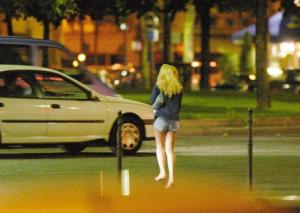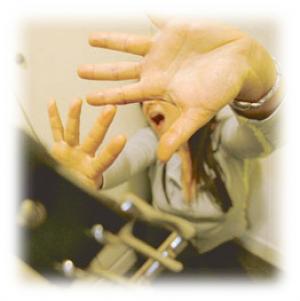Violence against women
Key facts:
-
Violence against women is a major public health problem and a violation of human rights.
-
Lack of access to education and opportunity, and low social status in communities are linked to violence against women.
-
Violence by an intimate partner is one of the most common forms of violence against women.
-
A wide range of physical, mental, sexual and reproductive, and maternal health problems can result from violence against women.
-
Many women do not seek help or report violence when it occurs.
http://www.who.int/mediacentre/factsheets/fs239/en/index.html
Action in support of Women:
A SIGN OF HOPE
The “Nid” (Nest in English) is an organisation whose members actively go out to meet women who are working on the streets. The organisation acts out of deeply rooted beliefs and a profound sense of the importance of their work.
Marie Jose has been working with the “Nid” for the past 5 years and meets and welcomes these women in their places of work.
The following are some of the movement’s deepest convictions. We wish to affirm:
- That prostitution is a permanent violation of human rights and wounds the dignity and freedom of individuals; it is not “a necessary evil”, an inevitable fact of life nor a trade or a way of earning one’s living. No one is born a prostitute, a client of prostitutes or a pimp.
- That prostitution is an exploitation of individuals who are in distress and is a symptom of the inequalities that exist in our world and the fragility and distress of peoples.
- That in a world where prostitution degrades people, the “Nid” offers a sign of hope, inviting us to believe that the world can be transformed by a commitment to a process of humanisation of the structures of our society.
- That prostitution is a form of human trafficking that considers the human body as a sexual object that can be bought and sold like merchandise.
Given these convictions, I would like to share with you something of my experience in my work with the “Nid”. As I go out to meet with these women in their places of work, either in the afternoon or in the evening, I prepare my heart so that I can bring to them the loving presence of Christ. My encounters with them are characterised by respect and love.
We always go out in pairs and we approach them in a very simple way, telling them our first names and who we are. Generally speaking, we are warmly welcomed. They tell us their first names, where they come from and how long they have been there. We listen attentively to what they say.
However at the present time we come up against a language barrier since the majority of the women are foreigners who have come from Africa: Sierra-Leone or Nigeria where English is spoken. They also come from Cameroon or from Eastern European countries such as Bulgaria and Albania.

Apart from women from Cameroon who for the most part are aged between 40 and 50 years and two or three French women who receive clients in lorries, the women that we meet on the streets are generally young. We feel very helpless and ill equipped to help them to get out of this dreadful situation. We invite them to come to the refuge that we have set up but they do not come. They tell us that they would like to be able to do something else but that they are caught up in an entire network. They stay in one place for about three months and they then move on to another city. There is quite a turnover of women. Usually when we approach them, their mobile phones ring – obviously they are being watched. They always welcome us and thank us for coming and some even embrace us on saying goodbye.
This winter one woman from the Cameroon invited us into the vehicle that she was working in to talk to us about her problems of money and housing.
How do they get to France?
In their countries of origin where conditions are extremely difficult, they meet people who promise them employment in Western Europe. They are told that they will earn large sums of money. These people present themselves as benefactors. They organise all the details of the journey, providing false papers and transport and the women are then delivered up into a network operated by pimps. This is each woman’s painful story. Not one of them has made the choice to be a prostitute. The women are caught in a trap and cannot escape. Very occasionally one or two are saved. They approach the police and report the existence of the trafficking network but usually it is very difficult. When this happens we undertake to protect them and we help them to find housing and work. .
Our work is voluntary; we meet the women with empty hands but also with great respect and love.
Martine prayed the following prayer at a team meeting:
« Thank you Lord for your light and help, for having given meaning to our lives. Thank you for showing us the way, for enlightening the earth and all creation, for enabling us to see the light at the end of the tunnel. Give us strength to work to free people so that they will no longer be objects exploited for profit, so that they will no longer be humiliated and sullied by traffickers in human beings.
Thank you Lord for having forgiven us when we have not appreciated your beautiful gifts. Thank you Lord for not abandoning us, for having placed in our paths exceptional people who mediate your love to us.
Thank you Lord for being there on our pavements with those who may be rejected by the world but not by you. Thank you Lord for the members of the “Nid” who challenge us to reach out to others. Thanks to them I realise that I do have the courage to reach out my hand to others instead of closing myself up in my own concerns. ….. »

